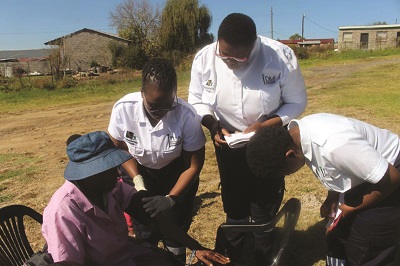By Limpho Rantletse, Lefulesele Mahana
The institute of Development Management (IDM) is recognized as the public higher education institution that offers programmes accredited by the council of higher education. Among its courses there is a one-year certificate offered in emergency health care. Students under this course conduct activities such as health talk on first aid, blood pressure tests and diabetes mellitus in Matsoatlareng village Maseru.
This was a public health management event, which was intended to assist and guide the community on how they can take care of themselves on a daily to avoid infections. The first disease discussed on the agenda was diabetes mellitus which affect anyone regardless of their age and gender. This illness is caused by over consumption of sugar in one’s body and blood. It occurs when the pancreas doesn’t produce enough insulin. There are two types of sugar diabetes, one is inherited and one just occurs as one ages, by injecting food like; white bread and too much potatoes. People are advised to consume food high in fiber such as whole wheat bread, fruits and vegetables. This unfortunately is a chronic disease, which cannot be cured but rather put in remission. The symptoms that can affect a person with sugar diabetes are as follows; regular urination, excessive thirst and tiredness. The person with sugar diabetes is advised to eat eggs, nuts, and fresh vegetables. To also engage in regular exercise, stress reducing activities, and consuming a lot of water can also help a person with sugar diabetes.
The secondly discussed illness by the student was high blood pressure. High blood pressure often has no symptoms. Confirmation of this illness can be through regular clinic check-ups. After confirming HBP a patient will be given medication to treat the disease. The medication may give negative side effects to some people, if that is the case they are urged to go back to the doctor so that they may be prescribed other medication.
Asthma was third on the list. A person with asthma experiences difficulty breathing. Asthma can interfere with daily activities, in some cases may be life threatening. Once a person can experience this, he/she is advised to rush for medical assistance. After the doctor confirms the condition, he or she will be given an asthma inhaler together with other medication. This illness can be triggered by air population, animal fur and fragile perfumes. Obese people can mostly be affected by asthma and healthy eating reduce its impact.
It was on this event when the community was also taught on how to take care of one’s wounds. One of the students explained that when washing the wound one should soak a cloth in tap water and gently dap the skin with it. It was further indicated that a wound should not be cleaned with any chemicals rather using salty water. A person should start cleaning the inside of the wound then move to the outside to avoid spreading infections, this also aids in the healing process.
The last illness discussed on the agenda was epilepsy which may occur as a results of a genetic disorder such as trauma or stroke. A person with epilepsy may cry out, fall, shake and become unaware of what’s going around them. We can help a person with epilepsy by loosen up any tight clothing on his or her body, such as the belt, necklaces and put him or her down slowly and turn him/her gently on the left side. During the course of the event the community members were examined and tested for all the above mentioned illnesses.


